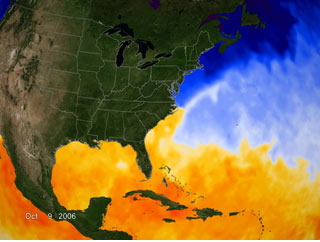Climate change to cause more extreme weather
Climate change to cause more extreme weather
mongabay.com
October 19, 2006
Climate change will cause extreme weather to be a more common occurrence according to new computer modeling by researchers from the National Center for Atmospheric Research (NCAR), Texas Tech University, and Australia’s Bureau of Meteorology Research Centre.
Unlike previous studies which looked at how average temperature or rainfall might change due to climbing levels of greenhouse gases, the new study, which will appear in the December issue of the journal Climatic Change, examined how weather extremes could change.
“It’s the extremes, not the averages, that cause the most damage to society and to many ecosystems,” said NCAR scientist Claudia Tebaldi, lead author for the report. “We now have the first model-based consensus on how the risk of dangerous heat waves, intense rains, and other kinds of extreme weather will change in the next century.”
 NASA image showing sea surface temperature (SST) data for the Gulf of Mexico and the Atlantic Coast region on October 9, 2006. The images come frp, NASA’s new Live Sea Surface Temperature Web Page |
Drawing on sophisticated computer modeling recently conducted for the Intergovernmental Panel on Climate Change, the researchers created three future climate scenarios to “account for uncertainty over how fast society may act to reduce emissions of carbon dioxide and other greenhouse gases over coming decades.” The results showed varying increases in the number of extremely warm nights, the length of heat waves, and the number of days with heavy precipitation, The researchers said that the models predict a significant increase in the average growing season across most of North America and Eurasia, but drier climate and worsening droughts in western United States, southern Europe, eastern Brazil, and several other areas.
In a news release from NCAR, the authors note that because “most of these trends are significantly weaker for the lowest-emission scenario than for the moderate and high-emission scenarios… lowering the output of greenhouse gases over the next century should reduce the risk that the most severe changes will occur.”
This article in based on a news release from NCAR